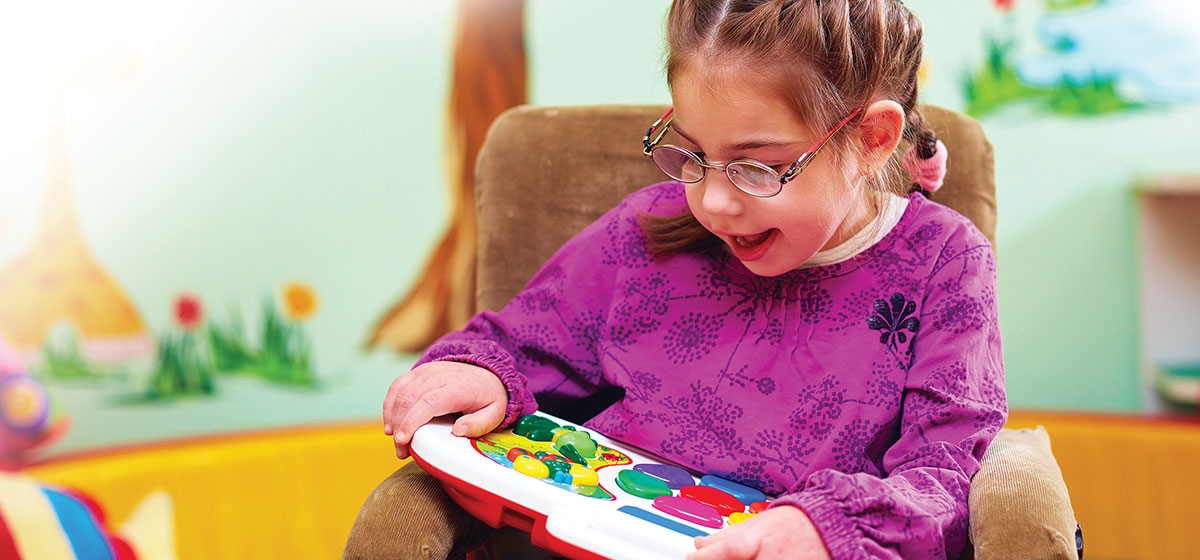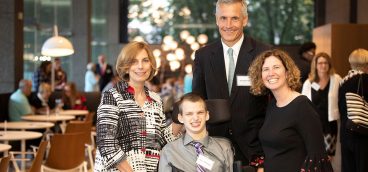Helping Children Heal and Thrive

When Pamela Schanwald was pregnant, doctors relayed a terrifying image from an ultrasound: extra skin on the back of her son’s neck indicated possible Down syndrome. She immediately began searching for day care options in the Pittsburgh area for children with special needs. She couldn’t find any.
“Obviously, I knew it would be a lifelong situation,” she said of raising a child with special needs. “I started wondering what other families in my situation did and started interviewing them. In many families, someone had to quit their job and stay home.”
Schanwald was just under two years into her position as CEO at what was then the Children’s Home of Pittsburgh. At the time, the nonprofit organization served as an adoption center and had an eight-bed pediatric hospital. Those offerings would soon expand.
Pittsburgh is home to three large institutions that offer wide-ranging services for children with medical needs. All three have rich histories dating back more than 100 years. Combined, they run the gamut of pediatric transplantation and adoption to brain injury rehabilitation and transitional care for infants and children trying to return home from the hospital.
Sometimes they compete, but more often they work collaboratively and refer patients to each other.
They are: Children’s Hospital of Pittsburgh of UPMC, The Children’s Institute and Schanwald’s organization, now known as the Children’s Home of Pittsburgh & Lemieux Family Center, which will celebrate its 125th birthday during a March 3 gala at Heinz Field.
“I think that Pittsburgh is so unique in the amount of really good services available for pediatric care,” Schanwald said. “It’s incredible.”
Schanwald gave birth to her son, Samuel, in 1995. The suspected extra skin on the back of his neck was the umbilical cord wrapped twice around his head. He was a healthy newborn.
Still, her scare led to a new mission. She lobbied heavily for legislation to create licensure for pediatric extended care centers in Pennsylvania, places where children with special medical needs can receive care while parents go to work.
In 1998, The Children’s Home opened Child’s Way as the state’s first licensed prescribed pediatric extended care center.
“It just made sense to have the option for parents to bring kids to a place where they could receive these services each day,” Schanwald said.
Child’s Way is just one of many services provided by The Children’s Home of Pittsburgh & Lemieux Family Center. Pittsburgh Penguins part-owner and legend Mario Lemieux joined forces with the organization in 2007 when he donated $2 million. All told, the nonprofit promotes the health and well-being of children and infants through services such as adoption, a pediatric specialty hospital and Child’s Way.
The 63,000-square-foot facility in Friendship with a $14 million annual budget includes an expanded 30-bed pediatric specialty hospital with units that provide continued acute care for infants and children making the transition from hospital to home.
The Friendship building has many family spaces throughout, including an enlarged family living area and “Austin’s Playroom” for healthy siblings.
Nathalie Lemieux, Mario’s wife, came up with the idea of Austin’s Playroom when she delivered their son, Austin, three months prematurely in 1996. During her stay at Magee-Womens Hospital in Oakland, the family found there was nowhere for daughters Lauren and Stephanie to relax. She decided to open playrooms in hospitals and health care facilities to keep siblings occupied.
There are now 35 such playrooms in Western Pennsylvania and beyond that contain toys, games and books along with other features such as iPads and train tables.
The Children’s Institute
In Squirrel Hill, The Children’s Institute, on Shady Avenue boasts the slogan: “Amazing Kids. Amazing Place.”
The institute, established in 1902, employs more than 600 fulland part-time workers on an operating budget of about $48 million. Most of its revenue comes from government sources, the rest from foundation, corporate and individual contributions.
Its pediatric hospital cares for about 460 inpatients a year and, combined with five satellite locations, averages more than 81,000 annual outpatient visits, handling brain injury, pain and spinal cord injury rehabilitation along with feeding and swallowing programs, behavioral health and orthopedic rehabilitation. It also offers a program for Prader-Willi syndrome, a genetic chromosome abnormality characterized by a constant hunger that can lead to obesity.
In addition to the hospital, the Children’s Institute runs an approved private school, The Day School, for about 200 children with special needs from more than 65 school districts. It also has an adoption and foster care center serving families in Allegheny, Beaver, Washington and Westmoreland counties.
“It’s just phenomenal, the culture and the commitment to children,” said Wendy Pardee, the Children Institute’s new CEO.
Pardee took over in August, replacing long-time CEO David Miles, who worked there for 40 years. She called the position her dream job.
“I have worked in the nonprofit sector for 20 years and I have not experienced this level of passion,” Pardee said. “People are here not to collect paychecks; they are here because they really are passionate about serving kids, serving their families and creating the absolute best outcomes, and I see that across the board.”
They’ll take cases like 7-year-old Tremont “Trey” Seals, who suffered a traumatic brain injury after a July 4 hit-and-run accident in Buffalo left him in a temporary coma. Specialists at the Children’s Institute re-taught him during a six-week stay how to walk and talk and feed himself.
He’s still got a long way to go in recovery, but was able to return home to Buffalo in September.
“I stayed here in Pittsburgh and watched my son learn how to be a kid again, I watched my son have to learn how to crawl and swallow food again,” his mother Tameka Jones wrote in a Sept. 14 Facebook post. “I fought back plenty of tears on plenty occasions.”
Pardee said it’s difficult to contain her emotion in relaying some of their success stories.
“You get attached to these children,” she said. “When they are discharged, part of me is happy for the families, because it’s so difficult for them, I’m also sad they are leaving. Usually we are being referred from some other inpatient organization that is not doing rehabilitation services.”
At The Day School within the institute, all students, ranging from ages 5 to 21, have individualized education plans.
“There is no one specific profile of a student,” said Chief School Administrator Cynthia Morelock. “We might have a student who has limited mobility and uses a wheelchair, or a nonverbal student who uses an alternative or augmentative communication device.”
The school has a staff of about 185, including teachers, a psychologist, nurses, social workers and speech therapists.
Despite rumblings about the search for a merging partner over the past few years, Pardee said she has “pressed pause” on such efforts.
She’s interested in exploring better ways to incorporate telemedicine into treatment plans and may look to open other facilities in outlying regions.
“We have a father who is driving in here at least three times a week from Seven Springs with his son,” she said. “If I were able to deliver that service within his community, that would allow him to have a better quality of life. There are kids who are in outlying counties who need our services or there are kids conceivably in Ohio who need our services. So, how do we begin to expand our reach?”
Children’s Hospital
The region’s dominant facility for all things child health care, of course, is world-renowned Children’s Hospital of Pittsburgh of UPMC, in its 127th year of existence.
The 315-bed hospital in Pittsburgh’s Lawrenceville neighborhood, along with its satellite locations, care for more than 1 million outpatient visitors annually.
“I don’t know to what extent the community appreciates it, but it really is a jewel,” said Dr. George Gittes, chief of pediatric surgery at the University of Pittsburgh School of Medicine and also Children’s chair of pediatric surgery. “When you think about the commitment of the leadership, it is striking.”
The hospital’s Hillman Center for Pediatric Transplantation cares for among the most complex pediatric cases and performs some of the most difficult and complicated pediatric surgeries in the U.S.
There’s the case of Lucas Goeller, who received a lifesaving liver on July 1, 2015 at Children’s Hospital from a 3-year-old Nebraska girl, Olivia Swedberg, who had died of brain cancer a day earlier. He waited for 18 months for a transplant match, and doctors were uncertain how much longer he’d live.
Lucas, of Indiana Township, was 3 months old when doctors diagnosed him with a disease called biliary atresia. His bile ducts were inflamed. Bile built up and slowly began to destroy his liver. To have a chance at living, he would need a liver from a deceased infant, child or young adult.
He’s had many follow-up appointments and procedures, including another surgery, at Children’s since his transplant. Now 4 years old, Lucas attends preschool and is putting on much-needed weight as his digestion improves.
“Children’s Hospital and the teams that have taken care of Lucas have become an extension of our family,” said Lucas’ mother, Jessica Goeller. “The doctors, nurses and staff have always gone out of their way for our family during Lucas’ struggles as well as his milestones. Whether it’s allowing us to call their cell phones late at night to address a concern, or congratulating Lucas for an achievement, they are always there.”
She said of one of Lucas’ surgeons, Dr. George Mazariegos, is director of pediatric transplantation at Children’s. “He will tell you ‘We make our decisions as if Lucas, and the other kids, were our own.’ ”
Gittes, who arrived in Pittsburgh 12 years ago, said the hospital’s extensive research efforts attracted him. “It really is the premier place for pediatric surgeons doing research.”
Children’s is consistently recognized as a leader in National Institutes of Health (NIH)-funded pediatric research programs. In fiscal year 2016, pediatric research programs at Children’s Hospital and Pitt’s School of Medicine ranked 10th in funding from the NIH.
New research efforts include work on a brain tumor vaccine, and further testing a genetic procedure which could allow people with type 1 diabetes to generate their own insulin. Type 1 diabetes is an autoimmune disease in which the body mistakenly recognizes the insulin-producing “beta” cells in the body as foreign and kills them, resulting in high blood sugar levels. Patients require lifelong insulin now supplied through injections or an insulin pump.
Children’s is embarking on a new wide-ranging initiative called the Pittsburgh Study, which will collect various data from participants from birth. Areas of study include environmental factors, schooling, nutrition, exposure to pets, travel and sports. Researchers also plan to register kids at ages 6 and 12.
“We’re trying to learn more about what goes along with being a healthy high school graduate,” said Dr. Terence Dermody, chair of the Department of Pediatrics at the Pitt School of Medicine and physician-in-chief and scientific director at Children’s. “I think a healthy high school graduate, mentally and physically, constitutes a victory for Children’s Hospital.”




